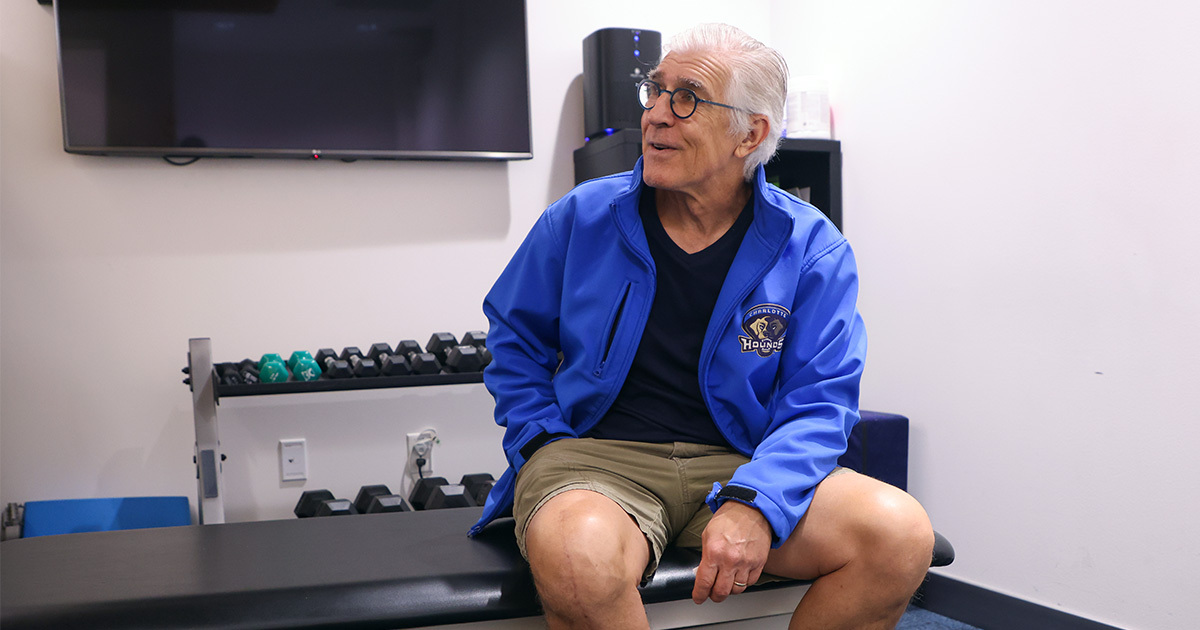Winning an Uphill Battle With Knee Pain
UT Health Austin’s Musculoskeletal Institute helps helicopter skier commemorate 65th birthday
Reviewed by: Michael Fedun; Karl Koenig, MD, FAOA, FAAOS, FAAHKS; and Patrick LaBrode, PT, DPT, OCS
Written by: Lauren Schneider

65-year-old Michael Fendun’s struggle with knee pain began with a soccer injury he sustained as a teenager in northeastern Ohio. At the time, he was treated with knee surgery to remove his lateral meniscus, which was followed by a knee arthroscopy two decades later. While he was able to participate in his favorite pastimes, such as biking and yoga, he noticed that his knee pain crept up when participating in extraneous activities.
Despite this pain, Michael decided to join his friends in Canada for helicopter skiing for the first time to celebrate his 50th birthday. “I had to ice my knee about every three days or so,” recalls Michael. “I went again in January 2019 for my 60th birthday. I was able to ski the first four days, but I had to quit early on the fifth day. It was just too painful.”
Planning your own ski trip? Explore tips on preventing the most common winter sports injuries.
<br>“Even more routine physical activities eventually became too painful to bear,” continues Michael. “Over the last three or four years, my knee got to the point where I couldn’t keep up with my wife or dog on our evening walks.”
Michael eagerly anticipated helicopter skiing with close friends in January 2024 to commemorate his 65th birthday. However, his knee pain made even the most basic movement painful. Attempts to alleviate his knee pain through corticosteroid injections and viscosupplementation treatment proved unsuccessful.
A Search for Relief After Years of Pain
One evening at a local dog park, Michael shared his dilemma with his neighbor, a practicing orthopedic physician who recommended Michael undergo imaging to gain greater insight into the source of his pain. This imaging revealed the extent to which Michael’s hip and knee were both affected by osteoarthritis, a painful condition caused by the erosion of the cartilage that cushions a joint.
Michael was advised to visit Karl Koenig, MD, an orthopedic surgeon who serves as the Executive Director of UT Health Austin’s Musculoskeletal Institute. In February 2023, Dr. Koenig and Michael met to discuss a treatment plan focused on his knee.
“Michael indicated that the pain and loss of knee function was impacting his quality of life, because he could no longer do activities he enjoyed,” explains Dr. Koenig. “To restore the level of function Michael was looking to achieve, we decided that knee replacement surgery was the most appropriate treatment option.”
Learn more about Dr. Koenig’s Dr. Koenig commitment to establishing connections with patients to better understand their priorities, preferences, and beliefs.
<br>A Patient-Centered Recovery Plan
At UT Health Austin, we take a multidisciplinary approach to your care. This means you will benefit from the expertise of multiple specialists across a variety of disciplines caring for you in one place to avoid having to schedule multiple appointments with providers at locations all over the city. The Musculoskeletal Institute care team includes orthopedic surgeons, sports medicine physicians, physician assistants, physical therapists, physiatrists, chiropractors, nurse practitioners, dietitians, health social workers, and more who work together to help you get back to the things in your life that matter most to you.

Michael worked closely with several of the clinic’s physical therapists, who offered both prehabilitation training before his knee replacement surgery and additional physical therapy as he recovered. “Michael’s goal was ride the helicopter up to the mountain and safely cruise down, maintaining stability and control,” shares Patrick LaBrode, PT, DPT, OCS, a licensed physical therapist in the Musculoskeletal Institute. “As physical therapists, our job was to break down the movements involved in skiing and work towards achieving those.”
As Michael’s knee was on the mend, LaBrode played an important role in getting Michael’s hips in shape for his ski trip. “Skiing involves shifting weight from side to side, so I focused on exercises that challenge the body to remain stable while standing on one leg,” adds LaBrode.
In addition to his longer-term objective of skiing, physical therapy helped Michael achieve a more immediate goal—dancing at his daughter’s wedding two months after his surgery. “I only danced to two songs, because I didn’t want to put strain on my knee, but we had a great time,” reveals Michael.
A Man of Action
By November 2023, Michael was cleared to participate in his upcoming skiing trip. “He had regained his strength, and I had confidence he could ease back into skiing safely because of his years of experience,” says Dr. Koenig.
Two months later, Michael hit the slopes with his friends once again. “Being able to float through the powdery snow without my knee hurting was incredible,” shares Michael, “and because of the physical therapy, my leg strength was excellent.”
Just as Michael’s active lifestyle has allowed him to enjoy precious milestones with family and friends, the active role he played in his own care and recovery contributed to his positive post-surgical outcomes.
“Michael was fully engaged at every stage of the care process,” notes Dr. Koenig. “The more proactive a patient is in collaborating with their care team by asking questions and following their recommendations, the better their outcomes are likely to be.”
Learn how to take charge of your health by making the most of your appointment.
<br>“If you’re struggling with joint pain, don’t wait to seek care,” warns Michael. “If I had pursued treatment when my condition first started to really deteriorate a few years prior, I would have been able to do more of the things I love without experiencing pain.”
For more information about the Musculoskeletal Institute or to request an appointment, call 1-833-UT-CARES (1-833-882-2737) or visit here.